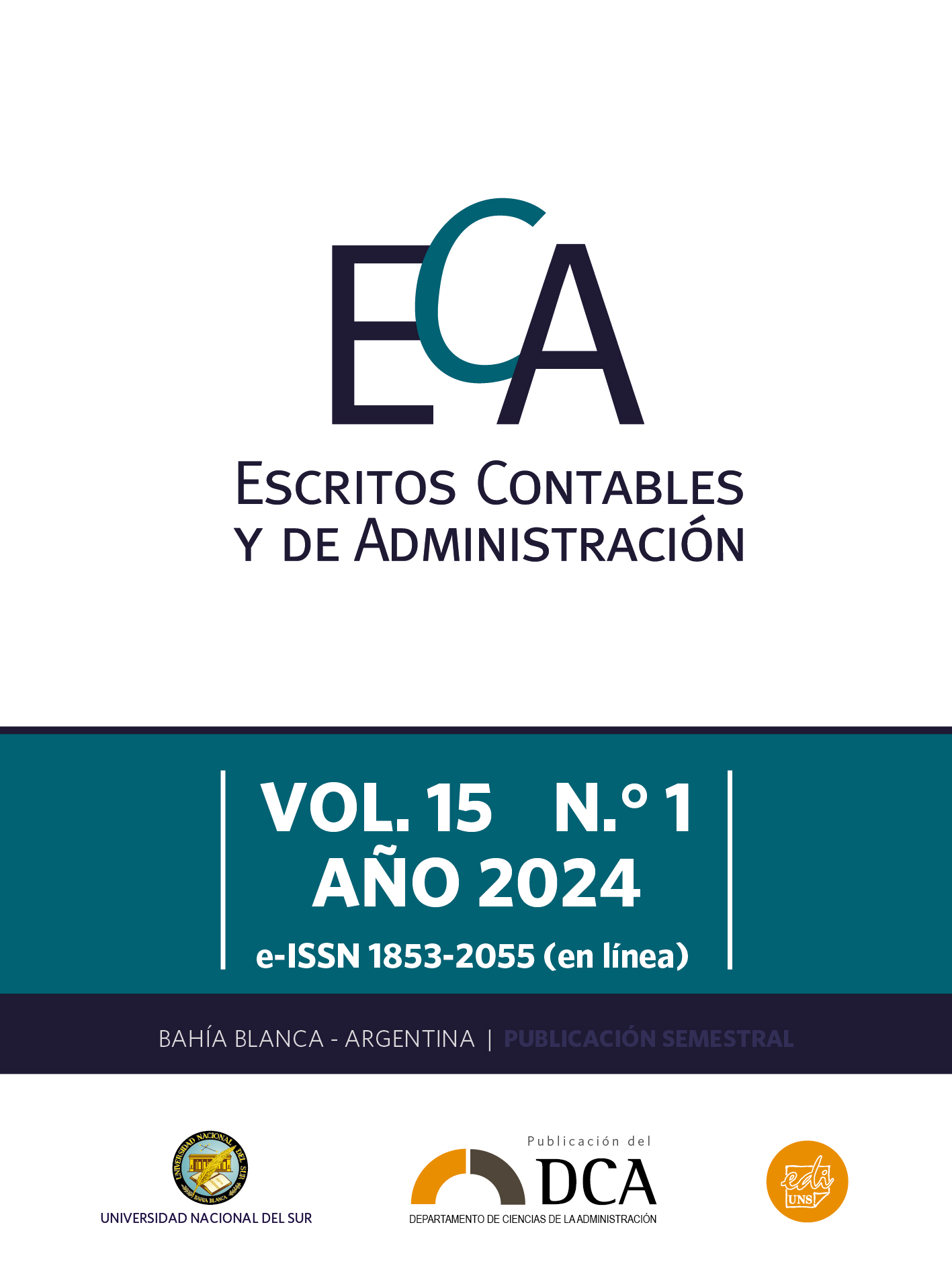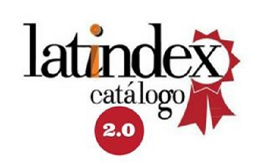Consistency in sustentability disclosure in argentine companies adhering to the global compact
DOI:
https://doi.org/10.52292/j.eca.2024.4460Keywords:
commitment, information, sustainable development, Argentine companiesAbstract
Argentine companies include the issue of sustainable development in their strategic decisions, which is why it is of interest to analyze their reports and reveal what they disclose, in the form of definitions and actions. For this reason, the objective of this study is to identify whether the disclosure made by companies, on sustainability in the Reports and/or Memorandums, is consistent with what they propose at a strategic level in these documents. To this end, a qualitative, exploratory, descriptive and reflective content analysis of the reports of the eleven Argentine companies adhering to the Global Compact that participated in its Sustainable Development Goals Ambition Accelerator Program in the year 2021 is carried out. The results confirm the consistency and alignment of their actions with the strategic definitions on sustainability. Furthermore, it can be concluded that, given the broad field of action they propose, studies on materiality, measurement of impacts in the value chain, among others, can be conducted.
Downloads
References
Alonso-Almeida, M. M., Marimon, F. y Llach, J. (2015). Difusión de las memorias de sostenibilidad en Latinoamérica: análisis territorial y sectorial. Estudios Gerenciales,31(135),139-149. https://www.icesi.edu.co/revistas/index.php/estudios_gerenciales/issue/view/215
Aranguren-Gómez, N. (2016). Divulgación de información social y medioambiental: un análisis de los patrones de comportamiento de empresas europeas cotizadas desde la teoría neo-institucional. Revista Española de Financiación y Contabilidad, 45(2), 199–230. https://doi.org/10.1080/02102412.2016.1140393
Belkaoui, A. y Karpik, P. G. (1989). Determinants of the corporate decision to disclose social information. Accounting, Auditing and Accountability, 2(1), 36-51. https://doi.org/10.1108/09513578910132240
Bertels, S. y Fraser S. (2010). Embedding Sustainability in Organizational Culture. A how-to Guide for executives. Network for Business Sustainability. http://livebettermagazine.com/eng/reports_studies/pdf/Executive-Report-Sustainability-and-Corporate-Culture.pdf
Berthelot, S., Cormier, D. y Magnan, M. (2003). Environmental, disclosure research: review and synthesis. Journal of accounting literature, 22, 1-44. https://www.researchgate.net/publication/285059735
Convención Marco de las Naciones Unidas sobre el Cambio Climático. (11 de diciembre 1997). ¿Qué es el Protocolo de Kyoto? https://unfccc.int/es/kyoto_protocol
Convención Marco de las Naciones Unidas sobre el Cambio Climático. (21 de marzo 1994). ¿Qué es la convención Marco de las Naciones Unidas sobre el Cambio Climático? https://unfccc.int/process-and-meetings/what-is-theunited-nations-framework-convention-on-climate-change
Cormier, D. y Gordon, I. M. (2001). An examination of social and environmental reporting strategies. Accounting, Auditing & Accountability Journal, 14(5), 587-617. https://doi.org/10.1108/EUM0000000006264
Cormier, D. y Magnan, M. (2003). Environmental reporting management: a continental European perspective. Journal of Accounting and Public Policy, 22(1), 43-62. https://doi.org/10.1016/S0278-4254(02)00085-6
DiMaggio, P. J. y Powell, W. W. (1983). The Iron Cage Revisited: Institutional Isomorphism and Collective Rationality in Organizational Fields. American Sociological Review, 48(2), 147-160. https://doi.org/10.2307/2095101
Donaldson, T. y Preston, L. E. (1995). The Stakeholder Theory of the Corporation: Concepts, Evidence, and Implications. The Academy of Management Review, 20(1), 65-91. https://doi.org/10.5465/amr.1995.9503271992
Freeman, R. (1984). Strategic Management: A Stakeholder Approach. Cambridge University Press. https://doi.org/10.1017/CBO9781139192675
García-Meca, E. y Pucheta-Martínez, M. C. (2017). How institutional investors on boards impact on stakeholder engagement and corporate social responsibility reporting. Corporate Social Responsibility and Environmental Management, 25(3), 237-249. https://doi.org/10.1002/csr.1451
Gamerschlag, R., Möller, K. y Verbeeten, F. (2011). Determinants of voluntary CSR disclosure: Empirical evidence from Germany. Review of Managerial Science, 5(2), 233–262. https://doi:10.1007/s11846-010-0052-3
Hernández-Pajares, J. (2018). Influencia de la naturaleza internacional de empresas peruanas en su información de sostenibilidad. Revista de Comunicación, 17(1), 74-92. https://doi.org/10.26441/RC17.1-2018-A4
Jara-Sarrúa, L. (septiembre, 2017). Comparabilidad de las Memorias de Sostenibilidad elaboradas con el estándar GRI-G4 opción Core. El caso de Argentina, Chile, Colombia, México y Perú [Ponencia]. 11th Centre for Social and Environmental Accounting Research (CSEAR) Spain Conference. Zaragoza, España. https://www.observatorioifrs.cl/wp-content/uploads/2020/06/CSEAR_2017.pdf
Jara-Sarrúa, L. (2022). Reportes de sostenibilidad en Latino América: una exploración a través del análisis de redes [Tesis de Doctorado, Universidad de Zaragoza]. https://zaguan.unizar.es/record/112133/files/TESIS-2022-074.pdf
Jugón-Sartorio, M., Pastor-Espada, S. P., Raffaelli-Cáceres, P., Mastropierro-Marchen, M. M. y Frosinini-Ramallo, J. D. (2023). La contribución al desarrollo sostenible de empresas argentinas intervinientes en el programa acelerador Ambition. CAPIC Review, 21, 1–14. https://doi.org/10.35928/cr.vol21.2023.186
Krippendorff, K. (2004). Reliability in content analysis: Some common mis conceptions and recommendations. Human Communication Research, 30(3), 411-433. https://doi.org/10.1111/j.1468-2958.2004.tb00738.x
Lindblom, C. (1993). The implications of organizational legitimacy for corporate social performance and disclosure: critical perspectives on accounting. In Critical Perspectives on Accounting Conference. New York, United States.
Meyer, I. (2007). Prejudice and discrimination as social stressors. En I. Meyer y M. Northridge (Eds.), The health of sexual minorities: Public health perspectives on lesbian, gay, bisexual, and transgender populations (pp. 242–267). Springer. https://doi.org/10.1007/978-0-387-31334-4_10
Ness, K. E. y Mirza, A. M. (1991). Corporate social disclosure: A note on a test of agency theory. The British Accounting Review, 23(3), 211-217. https://doi.org/10.1016/0890-8389(91)90081-C
Pacto Global Argentina. (2022). La década de la acción y las empresas responsables. Informe actividades 2021. UN Global Compact. http://pactoglobal.org.ar/memoria
Pacto Mundial. (s.f.). Los 10 Principios. UN Global Compact. https://www.pactomundial.org/que-puedes-hacer-tu/diez-principios/
Rabasedas, M. L., Del Barco, M. A. y Jara-Sarrúa, L. A. (2016). Análisis intersectorial de las memorias de sostenibilidad publicadas por empresas cotizadas en Argentina. Revista Saberes, 8(2), 133-160. https://doi.org/10.35305/s.v8i2.123
Ramírez-Molina, R. I., Ríos-Pérez, J. D., Lay-Raby, N. D. y Ramírez-Molina, R. J. (2021). Estrategias empresariales y cadena de valor en mercados sostenibles: Una revisión teórica. Revista de Ciencias Sociales, 27, 147-161. https://doi.org/10.31876/rcs.v27i.36999
Ramón-Llorens, M. C., Martínez-Ferrero, J. y García-Meca, E. (2021). Los ODS en Latinoamérica: compromiso y relación con la responsabilidad social. Contaduría Universidad de Antioquia (79), 63-78. https://doi.org/10.17533/udea.rc.n79a03
Rincón-Roldán, F. y López-Cabrales, A. (2021). Valores de la economía social: Gestión de recursos humanos y sostenibilidad. CIRIEC-España, Revista de economía pública, social y cooperativa, (102), 33-59. https://doi.org/10.7203/ciriec-e.102.18291
Rodríguez-Cortés M. (2021). La implementación de los ODS como herramienta de sostenibilidad en las empresas del IBEX35. RA & DEM Revista de Administración y Dirección de empresas, (5), 246-265. https://dialnet.unirioja.es/servlet/articulo?codigo=8260693
Senanayake, J., Dissanayake, D., Mayadunna, B. y Weerasekera, W. (2016). An approach to delineate groundwater recharge potential sites in Ambalantota, Sri Lanka using GIS techniques. Geoscience Frontiers, 7(1), 115-124. https://doi.org/10.1016/j.gsf.2015.03.002
United Nations Global Compact. (2017). Business Reporting on the SDGs: An analysis of the goals and targets. https://unglobalcompact.org/library/5361
United Nations Global Compact. (2021). SDG Ambition. http://unglobalcompact.org/sdgambition
Vegas-Tavera, D. (2020). Estrategias de branding para comunicar a sostenibilidad de las empresas B. [Tesis de Grado, Universidad Peruana de Ciencias Aplicadas]. http://hdl.handle.net/10757/653314
Vera-Martínez, P. S. (2018). El desarrollo sostenible y su inserción en la empresa ¿Institucionalización o más de lo mismo? [Ponencia]. XXIII Congreso Internacional de Contaduría, Administración e Informática. Ciudad de México, México. https://investigacion.fca.unam.mx/docs/memorias/2018/4.03.pdf
Watts, R. L. y Zimmerman, J. L. (1978). Towards a positive theory of the determination of accounting standards. The Accounting Review, 53(1), 112-134. https://www.jstor.org/stable/245729
Published
How to Cite
Issue
Section
License
Copyright (c) 2024 Mónica Jugón, Sandra Pastor, Pablo Raffaelli, Mariano Mastropierro, Joana Frosinini

This work is licensed under a Creative Commons Attribution-NonCommercial 4.0 International License.
Aviso de derechos de autor
Aquellos autores/as que tengan publicaciones con esta revista, aceptan los términos siguientes:
- Los autores/as conservarán sus derechos de autor y garantizarán a la revista el derecho de primera publicación de su obra, el cual estará simultáneamente sujeto a la licencia Atribución-No Comercial 4.0 Internacional CC BY-NC 4.0.
- Los autores/as podrán adoptar otros acuerdos de licencia no exclusiva de distribución de la versión de la obra publicada (p. ej.: depositarla en un archivo telemático institucional o publicarla en un volumen monográfico) siempre que se indique la publicación inicial en esta revista.
- Se permite y recomienda a los autores/as difundir su obra a través de Internet (por ej.: en páginas web institucionales o personales) una vez publicado su trabajo, lo cual puede producir intercambios interesantes y aumentar las citas de la obra publicada (Véase El efecto del acceso abierto).





















